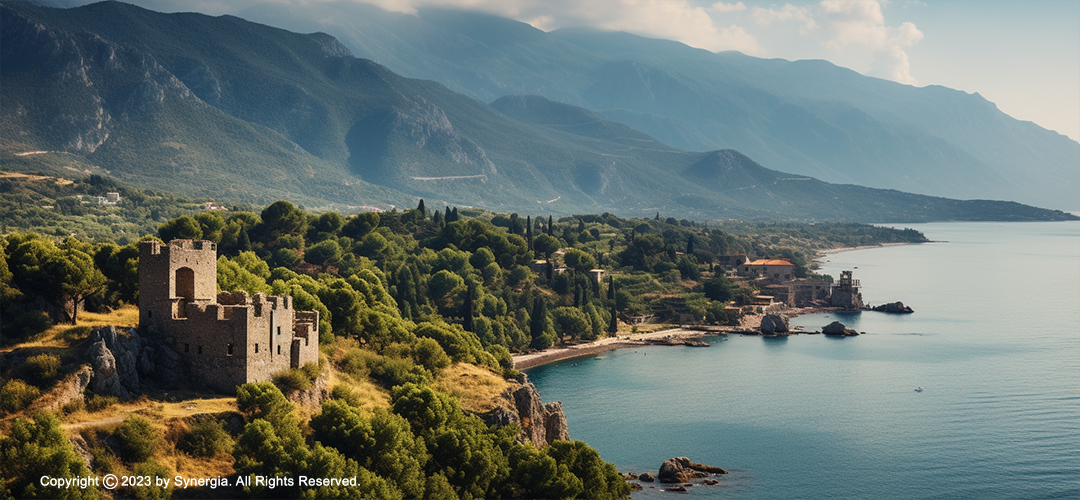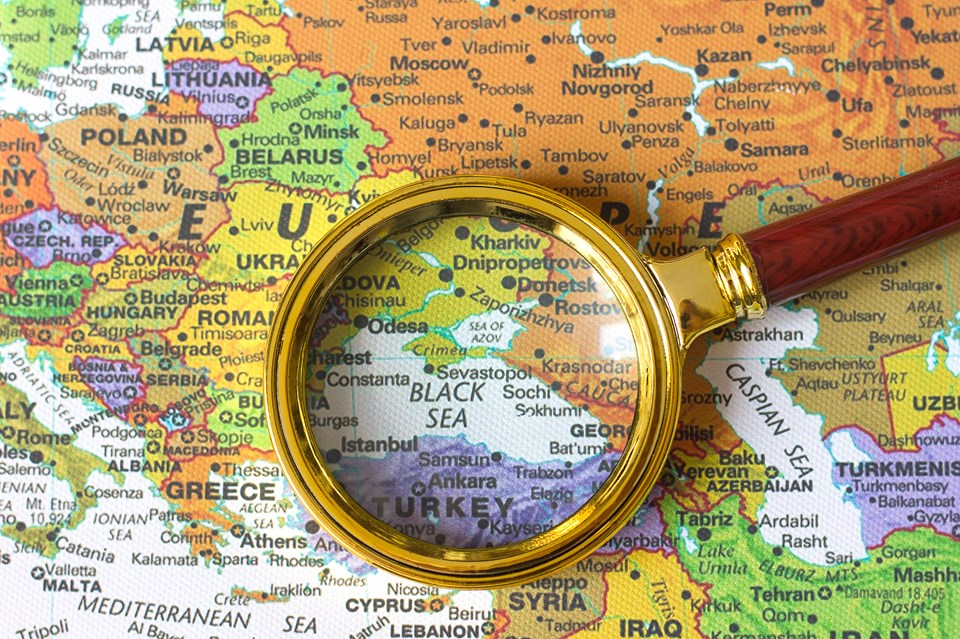Turkiye: Balancing the East and West
July 22, 2023 | Expert Insights

Historically, Türkiye has been the land bridge between Asia and Europe. Ankara has consistently leveraged this geographical advantage in its diplomatic outreach to remain consequential for both the Western powers and their Eastern rivals.
The latest iteration of this is clearly visible in the current Russia-Ukraine war. However, as Russian power declines and President is back in the saddle for the third time in a row, it would be interesting to see how Türkiye plays its cards.
Background
As the successor to the Ottoman Empire, modern Türkiye cannot be faulted to harbour ambitions of regaining past glory. Withing Türkiye, there is immense anguish and anger on being consigned to the dustbin of history, a fate it suffered for decades after the dismemberment of the Ottoman Empire post World War I.
This empire encompassed the Middle East, Europe and the Caucasian region. It was a hub where the competing interests of different powers clashed with each other. Far-flung provinces of this empire included those in North Africa. Thus, this empire had interests in various parts of the world.
Once, the Ottoman Empire was a major threat to Western Europe. Over time it fossilised, and Russia eclipsed it. Relations between the declining and the rising powers remained mostly adversarial in nature as Russia sought access to the Black Sea to reach the warm waters of the Mediterranean Sea.
When the Ottoman Empire collapsed, its Anatolian heartland became the nation-state of Türkiye. At the same time, the USSR emerged out of the Russian Tsarist Empire. During the Cold War, these two entities were on the opposite side. Following the end of the Cold War, relations returned to a certain level of normality. All this changed with the rise of two strongmen in both countries: Recep Tayyip Erdogan and Vladimir Putin. The relationship has become more complicated. And the Russia-Ukraine war has added further to this complication.

Analysis
Türkiye is a key member of the Western NATO alliance. So, when the Russia-Ukraine war began, it was expected that it would join its Western allies in siding with Ukraine against Russia. But this did not happen. Türkiye took a much more nuanced position. Its policy on this war has evolved with time. All the time, it has placed the greatest priority on the protection of Turkish interests above all else.
In the beginning, Türkiye was a fence sitter and refrained from openly condemning Russia. The war was seen as something which was not directly its concern. Ankara was hoping that the war would be short, at the end of which both Moscow and the Western countries would be much weakened. Türkiye already had ongoing issues both with Western Europe and Russia. Hence weakening of both sides sounded beneficial to it.
Türkiye has had points of conflict with Russia in quite a few areas. First, it was in Türkiye’s near abroad, i.e., the Middle East. Here the unrest of the Arab Spring created instability. Many of the regimes aligned with Russia were threatened or overthrown. Türkiye was especially interested in two-Syria and Libya- critical to its security and energy interests and where it wanted to supplant Russia and the West.
Libya is an interesting case study of how Türkiye has been a major player in its dismantling as a credible nation-state. After Colonel Gaddafi's overthrow (and brutal end), the power slipped into the hands of two rival factions-the Tripoli-based Government of National Accord (GNA) and warlord Khalifa Haftar who controlled most of the eastern part of Libya. The GNA had the support of Ankara while the Russians (with their Wagner Group) propped up Khalifa Haftar. Türkiye won international support, including the UN recognition of the GNA, a major achievement.
The situation in Syria is, however, far more complicated. Initially, when the Arab Spring broke out, a host of assorted protest movements sprang up against the repressive Assad regime. Russia, and earlier the USSR, had always considered Syria as their primary client state in the Middle East after they lost out to the West in Egypt and Iraq. So, their involvement on the side of the Assad regime was expected. For the Turks, Syria, especially Northern Syria, is of great interest as it is inhabited by Kurds, who are Türkiye's arch-enemies. So, Ankara put its weight behind the Islamist rebels opposing Damascus and was on the same side as the Kurdish rebels who, too, were battling Assad!
However, this policy eventually boomeranged on the Turks. As Syria destabilised, the Kurds in its northern provinces began to seek autonomy, discretely supported by the U.S. and its allies. These Kurds were closely linked with Kurds in Türkiye’s southern provinces. This was anathema for Ankara. Its worst nightmares were coming true. Suddenly Assad and his Russian ally appeared to be the lesser evil in Syria.
A deal was struck with Assad and the Russians. Under this deal, Türkiye would put military pressure on the Kurds from its side of the border, and Assad would push forward on the Kurdish areas from his side. Ultimately this deal worked. Assad recaptured the Kurdish part of his country, and Türkiye was saved from a Kurdish homeland on its southern border. The losers were the Syrian people and the West. Türkiye’s national interests trumped any commitments it might have had towards the Syrian people or the West. This was realpolitik in all its harsh, unsavoury reality. The Russians benefitted. But this was never the main intention of Turkish policy here. It was just a side effect.
In the Caucasus, the one conflict where Türkiye and Russia have been facing each other is in the territorial dispute between Armenia and Azerbaijan, especially in Nagorno Karabakh. Here there is strong ethnic and religious solidarity between the Turks and the Azeris due to their common Turkic and Islamic identity. Armenia is a Christian nation. As the supposed protector of the world's Christians, Russia has felt an obligation to help this country.
The same cynicism that Türkiye has followed in its dealings with Russia in all the above cases has continued during the Ukraine war. Trade with Russia has mostly continued unabated despite the bevvy of sanctions imposed on Moscow by the West. Oil trade has played a big part in this. This has fuelled Russia's economy considerably since it lost serious access to its major European market. In this way, Türkiye has actually aided the Russian war effort.
President Erdogan was feted globally, especially by the food-importing nations of Africa and Asia, when he convinced Mr Putin to allow Ukrainian grain to sail out of its besieged ports early this year. However, feeling cheated by the deal, Moscow has not agreed to any sequel to the agreement to allow further sea-borne movement of Ukrainian grain to world markets.
On the other hand, Türkiye has been supplying drones to Ukraine that have acquired a formidable battlefield reputation. Türkiye was designated a neutral holding area for some prisoners of war, but TV shots of some of the more prominent ones being escorted back to Ukraine on President Zelensky's aircraft triggered a storm of protests from the Kremlin.
Turkey has backed Ukraine wholeheartedly on the issue of Ukraine joining NATO (the underlying cause of the war). This is a big red line for President Putin, and once the final voting is over (which will be a long-drawn process), Türkiye may have to count the costs.
Ankara skilfully navigated the issue of Sweden’s NATO membership, leveraging its consent to a cessation of Kurdish activities in Sweden.
Assessment
- Turkiye is playing the game of diplomacy not for international peace or harmony but to secure the best deal for its nation. Despite a falling economy and rising political opposition at home, there is little to fault Mr Erdogan for his foreign policy initiatives from a Turkish perspective. However, how long can he continue to play this balancing game is a matter of conjecture.
- There is no love lost between President Erdogan and President Putin. Both being strongmen, they view each other as potential allies as well as adversaries. It is not a match made in heaven; instead, it is just a coming together of two people with common enemies. Such partnerships seldom sustain for long.
- The West has been tolerant of Turkiye because of its own concerns, including the role Turkiye can play in checking the flood of illegal immigrants into Europe. As long as the West and the East find Turkiye's strategic location relevant to their geopolitical manoeuvrings, it will be advantage Turkiye!








Comments